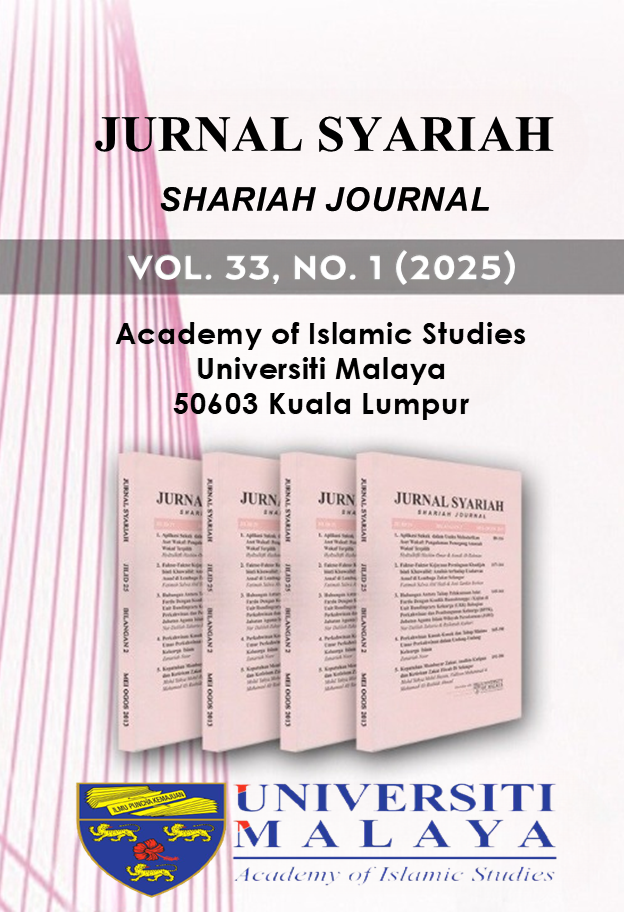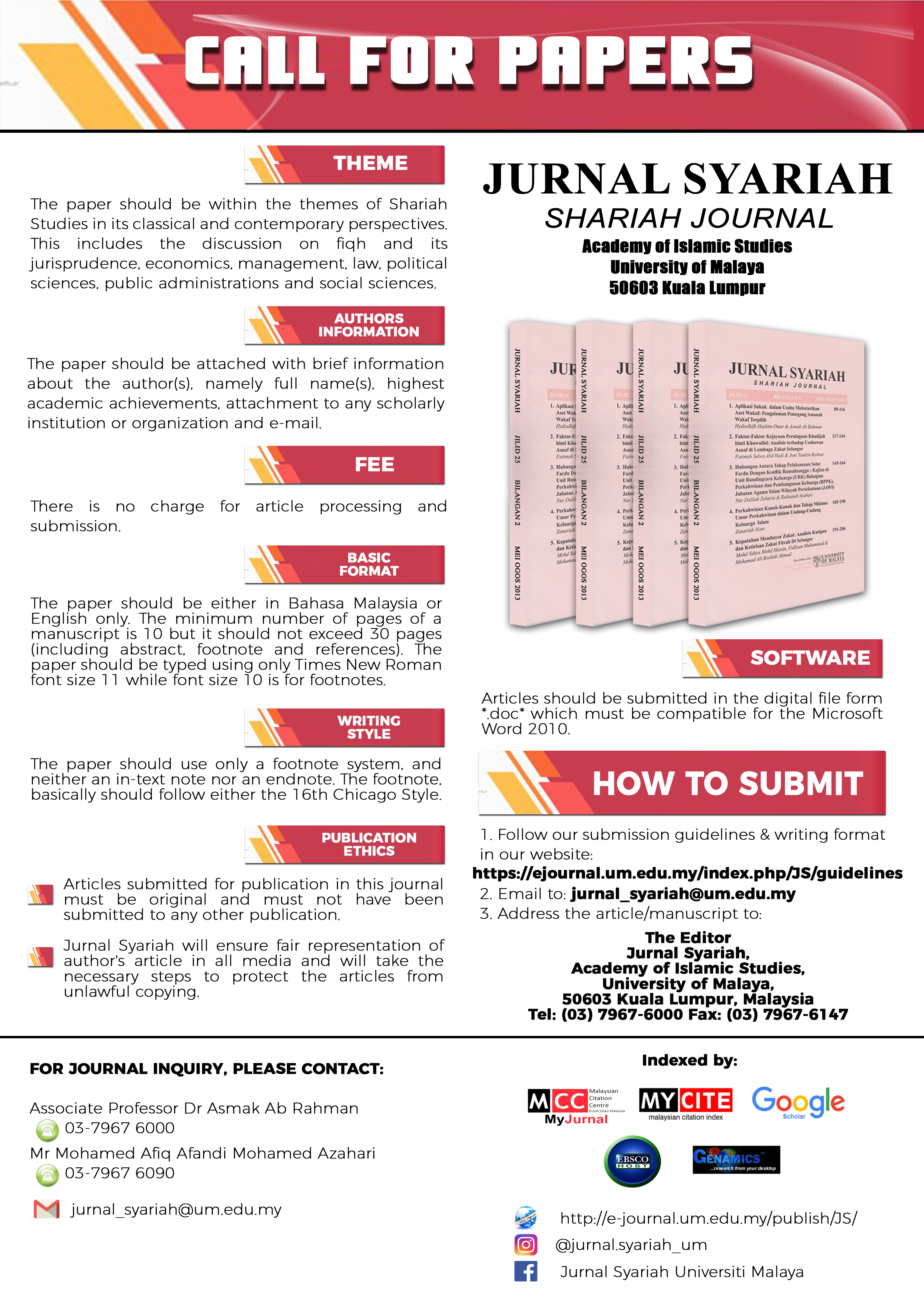EVALUATION OF THE KENYAN KADHI’S COURT BENCH BOOK FROM AN ISLAMIC SHARIA PERSPECTIVE: FOCUSING ON THE MARRIAGE SECTION
DOI:
https://doi.org/10.22452/syariah.vol33no1.3Keywords:
kadhis court bench book , marriage, Islamic Sharia, republic of KenyaAbstract
This study critically evaluates the Kadhis Court Bench Book, specifically examining the marriage section in Chapter Four, Articles 1 through 20, via the framework of Islamic Sharia. It assesses the strengths and weaknesses of these provisions, focusing on aspects of clarity, consistency, and adherence to Islamic legal principles. The research problem regarding the enactment of the Kadhis Court Bench Book arises from the judiciary's acknowledgment of inconsistencies in verdicts resulting from divergent opinions among the various schools of thought. To conduct this evaluation, a qualitative approach will be adopted, using methods such as document analysis, comparative analysis, case study review, and data interpretation. The findings show that the Bench Book lacks systematic organization, with certain sections deviating from essential Sharia principles or offering insufficient clarity. The reliance on lesser-known madhhabs in its application in Kenya contributes to inconsistencies, as certain provisions do not fully adhere to fundamental Sharia principles. Some provisions are difficult to implement and the arisal of ambiguities and gaps in specific provisions can lead to differing interpretations. Ultimately, the study recommends the creation of a systematical framework for continuous monitoring and evaluation of the Bench Book’s implementation, facilitating timely revisions to address emerging challenges in marital jurisprudence.
Downloads
References
Abdallah Mohammad Al-Qurtubi, al-Jami’li Ahkam al-Qur’an, Vol 3, (Cairo: Dar al-Kutub al-Misriyyah, 1964), 68.
Abdulkadir Al-Sanhuri, Al-Wajiz Fi Sharh Al-Kanun Al-Madani, (1st edn, Beirut: Dar Al-Nahdha, 1996), 630.
Abdulkadir Hashim, ‘Shaping of the Sharia courts: British policies on transforming the kadhi courts in colonial Zanzibar,’ A Journal of African Studies vol. 38/3 (2012): 13-14.
Abdulrahman bin Mohammad Al-Jazair, Al-Fiqh ala Al-Madhahib Al-Arba’, Vol 4, (2nd edn, Beirut: Dar Al-Kutub Al-Ilmiyyah, 2003), 304.
Abu Al-Hassan Ali bin Khalaf, Sharh Sahih Al-Bukhari, Vol 7 (1st edn, Saudi: Maktab Al-Rushd, 2003), 274
Abu Bakar bin Mas’ud Al-Kasani, Badai’ Al-sanai’ fi Tartib al-Shara’i, Vol 3, (1st edn, Pakistan: Maktab Al-Habibiyyah, 1409), 376.
Ahmad bin Mohammad bin Hanbali, Musnad Ahmad bin Mohammad bin Hanbali, Vol 6, (1st edn, Beirut: Alim al-Kutub, 1998), 165, Hadith No: 25840.
Ahmad Nashat, Risalat Al-Ithbat, (7th edn, Cairo: Dar Al-Fikr, n.d), 206.
Ahmed Bin Al-Hussein Al-Bayhaqī, Sunan Al-Kubra, Vol 3, (3rd edn, Beirut: Dar Al-Kutoub Al-Ilmiyyah, 2003), 92, Hadith No: 4984
Daily Nation, Kadhis Courts Illegal, Judges rules, Official Website: <https://nation.africa/kenya/news/kadhi-courts-illegal-judges-rule-635048> accessed on 10 October 2024
Ibn Hajar Haitham, al-Fatawa al-Fiqhiyyah al-Kubra, Vol 4, (1st edn, Beirut: Dar al-Kutub al-Illmiyyah 1403), 94.
Ibn Qudamah, Al-Mughni, Vol 7, (1st edn, Riyadh: Dar Alim al-Kitab, 1986), 473.
Ibrahim Al-Aqib Ahmad Jalal Din, Ahwal Shakhsiyyah, (1st edn, Sudan: Sudan Open University 2006), 97.
Ibrahim bin Ali al-Fairuzabadī, al-Muhadhab, Vol 2, (1st ed, Cairo: Issa al-Babī, n.d), 41.
Ibrahim Shadad, Imarat wa Sultanat Islamiyah Mansiyah fi Sharq Ifriqiyah, Official Website: <https://www.ethio monitor.net/ 9996/#:~:text=واسسوا%20امارات%20وسلطنات%20أسلامية%20ضمن,وجزيرة%20المافيا%20وجزيرة%20كيلوا%20كسوانى> accessed on 15 October 2024.
J. Spencer Trimingham, Islam in East Africa, (Oxford University Press, 1964): 7.
Jalal al-din Mohammad bin Ahmad Al-Mahalā, Kanzu al-Raghibina Sharhu Minhaj at-Twalibina, Vol 2, (Saudi: Dar al-Minhaj, 2013), 144.
JNO Advocates, Kadhis lack jurisdiction on Child Maintenance, Official Website: <https://jnoadvocates.co.ke/kadhis-lack-jurisdiction -on-child-maintenance/> accessed on 10 October 2024
Justin Willis and George Gona, “Pwani C Kenya? Memory, Documents and Secessionist Politics in Coastal,” Oxford University Press 112 no. 445 (2012): 3.
Kadhis court, list of Kadhis in Kenya, Official Website: <https://judiciary.go.ke/kadhis-courts/> accessed on10 October 2024.
kadhis-lack-jurisdiction -on-child-maintenance/> accessed on 10 October 2024.
Kenya Constitution of Kenya, 1963, Kadhis Court 179 (1) to (5), Official Website: <http://kenyalaw.org/kl/fileadmin /pdfdownloads/1963_Constitution.pdf> accessed on10 October 2024
Kenya Law, Bihija Ali Sempa & Hassan Ali Sempa v Bakari Mohamed Motte (Civil Appeal 18 of 2013) [2014] KEHC 2174 (KLR) (27 October 2014 (Ruling) Official Website: < https://new.kenyalaw.org/akn/ke/judgment/
Kevin Odimbe Wanyonyi, ‘The Kadhis Court in Kenya’ (Master diss., Master of Science in Development Studies, Lund University, 2016): 13-14.
Kuria Mwangi, The Application and Development of Sharia in Kenya, 1895-1990, National seminar on contemporary Islam in Kenya, 1995 Mewa, Signal Press Limited, 254.
Laws of Kenya, The constitution of Kenya, Kadhis Court 177 (1) to (5) Official Website: https://kenyalaw.org/kl/fileadmin/pdfdownloads/TheConstitutionOfKenya.pdf > 80-81 accessed on 10 October 2024.
Malik bin Anas, Muwatta’, Vol 4, (1st edn, Emirates: Muasasat Zaid bin Sultan Al-Nahayan Lilamal Al-Kheiriyyyah wa Al-Insaniyah, 2004), 848, Hadith No: 2188.
Mansour bin Yunuss Idris Al-Bahuti, Kashaf Al-Qana’, Vol 5, (1st edn, Beirut: Dar Al-Fikr, 1982), 142.
Manswab Mahsen Abdulrahman, Muslim Family Law and Practice: A Practical Guide to the Laws of Marriage and Dissolution of Marriage, (1st edn, Uganda: Islamic University in Uganda, 2024), 31
Manswab Mahsen Abdulrahman, Quḍāt al-Mazāri‘a Qabl Istiqlāl Jamhuriyat Keenya wa-ba‘d, Proceedings of International Conference on Reformation and Renewal in the light of Prof. Ali Mazrui’s Legacy and the Future of Reforms in the Muslim World (Khartoum: International University of Africa, Centre for research and African Studies, February 2019), 126.
Mohammad Abdallah Al-Naqirah, Intishar Al-Islam Fi Afrika wa Munadhahat Al-'Arab Al-Gharb lahu, (n.d, n.p), 63.
Mohammad Al-Zuheil, Tarekh Al-Qadha Fi Al-Islam, (1st edn, Syria: Dar Al-Fikr, 1995), 42-47.
Mohammad bin Ahmad Al-Aleish, Minah Al-Jalili ala Mukhtasar Al-Khalili, Vol 3 (1st edn, Beirut: Dar Al-Fikr, 1984), 415.
Mohammad bin ‘Ali Al-Shawkani, Fath Al-Qadir, Vol 5 (1st edn, Beirut: Dar Ibn Kathir, 1993), 292.
Mohammad bin Amin Umar Abdulaziz, al-‘Uqud al-Duriyyah fi Tanqih al-Fatawa al-Hamidiya, Vol 1, (2nd edn, Egypt: Matbah al-Maymaniyah, 1310), 29.
Mohammad bin Hassan Al-Jawahir, Nawadir Al-Fuqaha, (1st edn, Tunis: Dar Al-Illm, 1414), 83.
Mohammad bin Ismail Al-Bukhari, Sahih Al-Bukhari, Vol 7 (1st edn, Saudi: Maktab Al-Ma’rif, 1998), 7, Hadith No: 5158.
Mohammad bin Jarir Al-Tabari, Tārīkh al-Rusul wa al-Mulūk, (In Arabic) [The History of the Prophets and Kings] Vol 2 (2nd edn, Beirut: Dar Al-Turath 1387), 395.
Mohammad bin Sahl Al-Sarakhsi, Al-Mabsut, Vol 5, (1st edn, Beirut: Dar Al-Maarifa, 1989), 62-63.
Mohammad ibn Isa al-Tirmidhi, Sunan al-Tirmidhi, Vol 2, (1st edn, Beirut: Dar Al-Gharb, 1998), 390, Hadith No: 1089.
Mohammad Khatīb ash-Shirbīn, Al-Iqna’ fi Hal Alfaz ‘Abi Shuja’, Vol 4, (1st edn, Beirut: Dar Al-Fikr, 1995), 366.
Mohammad Nassir Al-Maruzi, Ikhtilaf Al-‘Ulama, (1st edn, Saudi: Dar Alim Al-Kutub, 1405), 125.
Mohammad Sheikh Alio, “Mahakim Al-Shari’ fi Jumhuriyyah Kenya wa Al-Tahadiyat allati Tuwajihuha Majallat,” Qirat Al-Ifriqiyyah 15 no. 1 (2013): 7.
Mohammad Sidiq Khan, Al-Rawdha Al-Nadiyyah, Vol 2, (1st edn, Saudi: Dar ibn Qaim, 2003), 294.
Mohammad Urufah, Hashiyah al-Dasouq ala Sharh al-Kabir, (1st edn, Beirut: Dar al-Kutub al-Illmiyyah 1417), 11.
Muwafaqdin Abdallah bin Qudama, Al-Mughni, Vol 5, (1st edn Cairo: Dar al-Hijra, 1412), 380.
Muwafaqdin Ibn Qudama, al-Mughni, Vol 7, (Oman: Matbaʿ al-Sultaniyyah, 1374), 432.
Mwenda Mukuthuria, “Islam and development of Kiswahili,” Journal of Pan African Studies 8 no. 2 (2009): 40.
Republic of Kenya, Kadhis Court Bench Book October 2020, Official Website: <https://www.studocu.com/row/ document/umma-university/criminal-law/kadhis-court-bench-book/61916213> retrieved 10/October/2024
Shamsudin Al-Sarakhsi, Al-Mabsut, Vol 4 (1st edn, Beirut: Dar Al-Marifa, 1993), 212
Sulayman ibn al-Ash’ath as-Sijistan, Sunan Abi Dawud, Vol 5, (1st edn, Beirut: Dar Al-Risalah Al-'Ilmiyyah, 2009), 444, Hadith No: 3592.
Tito Kunyuk, The Female Kadhi Controversy, Official Website: < https://www.theelephant.info/analysis /2021/ 11/12/the-female-kadhis-controversy/> retrieved 10/October/2024.
Wahbah Al-Zuhayli, Al-Fiqh Al-Islamī Wa’adilatuh, Vol 9, (4th edn, Syria: Dar Al-Fikr, n.d), 6927.
Yahya bin Sharaf an-Nawawī, al-Majmu’ Sharhu al-Muhadhab, Vol 9, (Saudi: Maktab al-Irshad, n.d), 144.
Yahya bin Sharaf an-Nawawī, al-Minhaj, Vol 3, (1st ed, Cairo: Dar Ihya, n.d), 216.
Downloads
Published
How to Cite
Issue
Section
License
Copyright (c) 2025 Jurnal Syariah

This work is licensed under a Creative Commons Attribution-NonCommercial 4.0 International License.
COPYRIGHT: All rights reserved. Not allowed to be reproduced any part of articles and contents of this journal in any form or by any way, whether electronic, mechanical, photocopying, recording or otherwise without permission in writing from the Chief Editor, Jurnal Syariah.



















